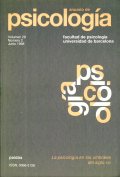La psicología cognitiva: ensayo sobre un paradigma en transformación
Paraules clau:
Symbolic-computational paradigm, connectionism, neurosciences, consciousness, emotions, situation models, artificial intelligence.Resum
This essay explores the current state of Cognitive Psychology at the verge of a new century. First, it analyzes the foundations of the symbolic computational paradigm (S-C), which reduces the mind to an information processing system, like a Turing machine or a computer. The S-C paradigm, however, has serious shortcomings in dealing with subjective experience (consciousness) and embodied features of cognition (e.g., emotions). Secondly, connectionism is described as a new emergent paradigm which overcomes the computer metaphor and strongly relies on the brain metaphor; in addition, it involves a new notion of computation as a parallel distributed processes. Thirdly, the main contribution of neuroscience is the new and more accurate measures of brain activity during cognitive tasks by rneans of neuroimaging, ERP techniques, and brain damage case studies. The advantages and shortcomings of connectionism and neuroscience are briefly considered. Finally, the paper proposes a challenge for the next century: the study of situation and episodic representation, which cannot be reduced to "semantic memory" organization. The development of this subject not only would improvpe our comprehension of how people encode and update everyday situations, but also would have technological consequences for developing intelligent machines.Descàrregues
Publicades
1998-01-12
Número
Secció
Articles
Llicència
El/la autor/a que publica en esta revista está de acuerdo con los términos siguientes:
El/la autor/a cede en exclusiva todos los derechos de propiedad intelectual al/la editor/a para todo el mundo y toda la duración de los derechos de propiedad intelectual vigentes aplicables.
El/la autor/a puede difundir una copia de sus artículos respetando la política de acceso libre de la revista.


